Europaudvalget 2012-13
EUU Alm.del Bilag 496
Offentligt
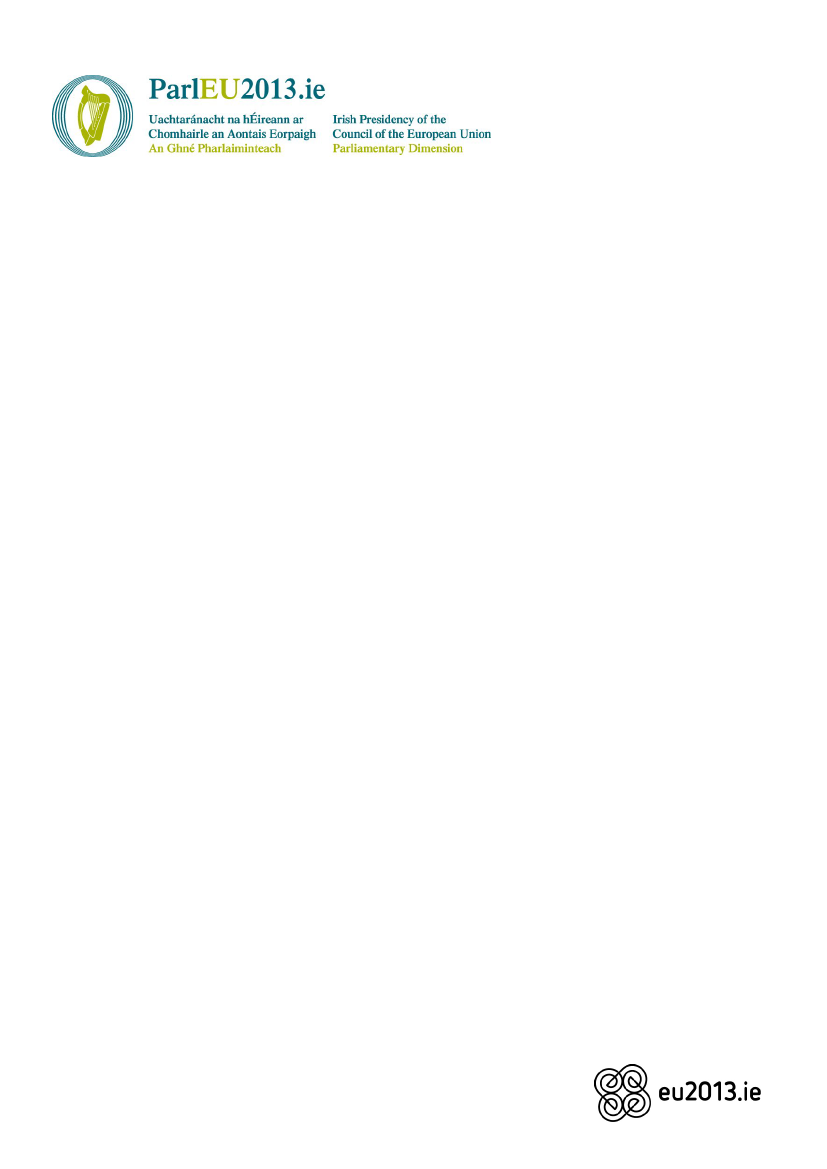
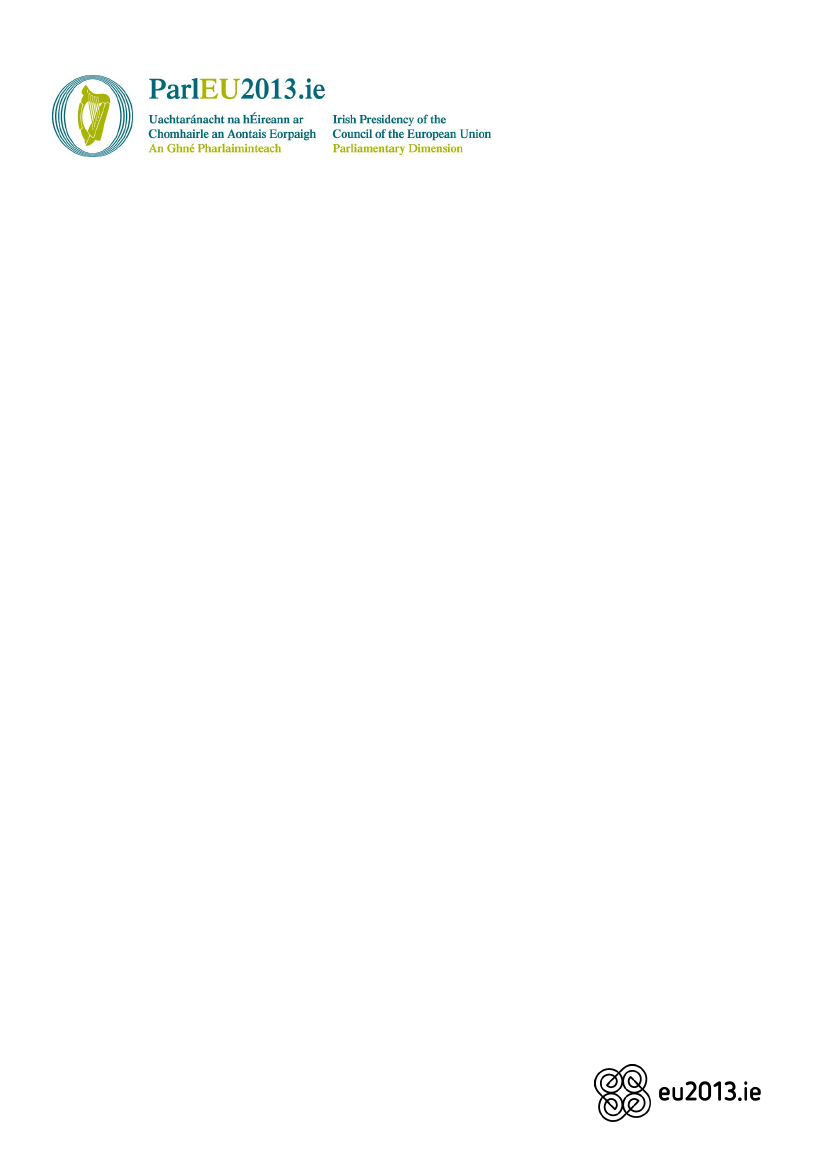
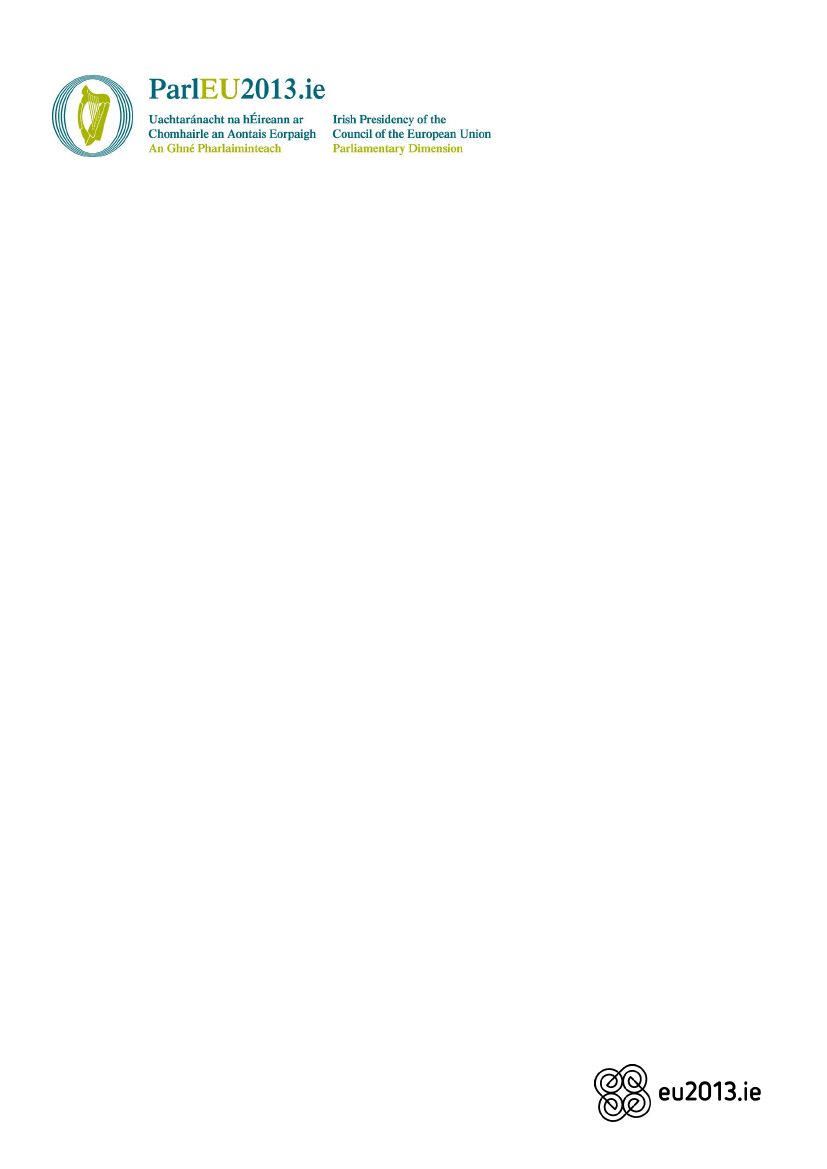
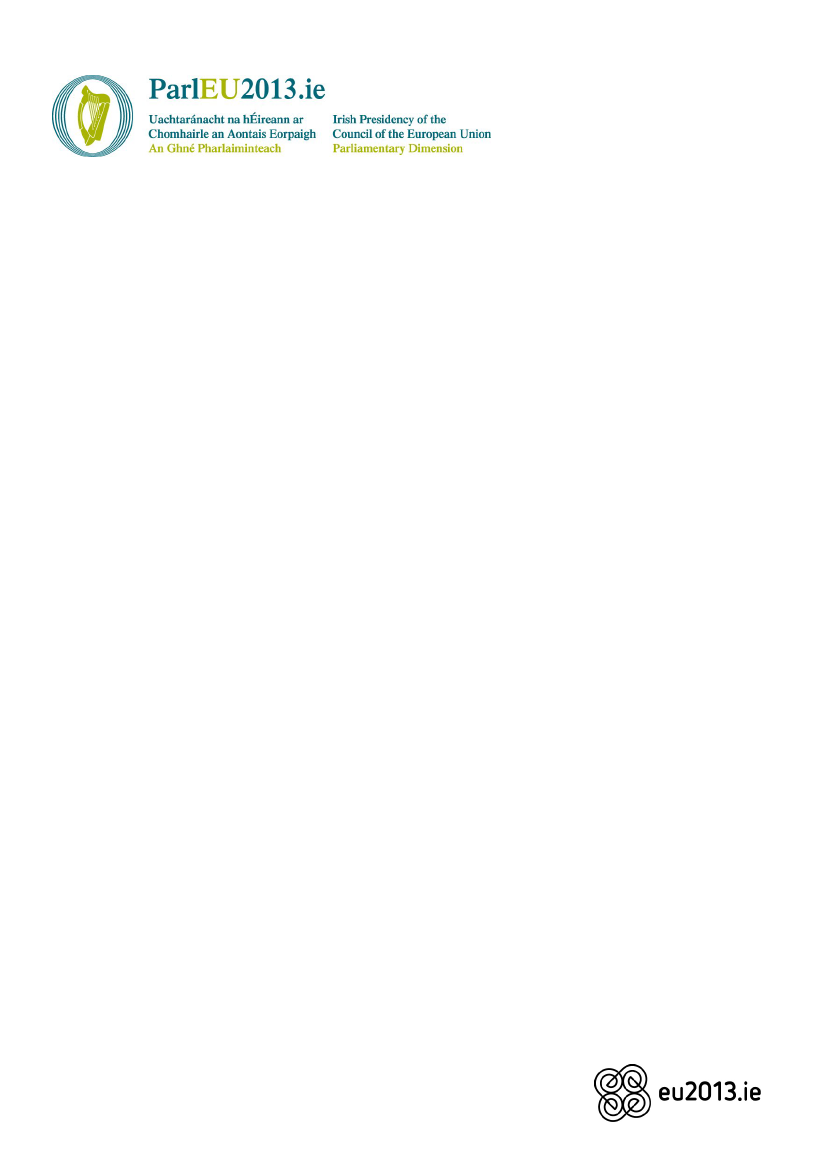
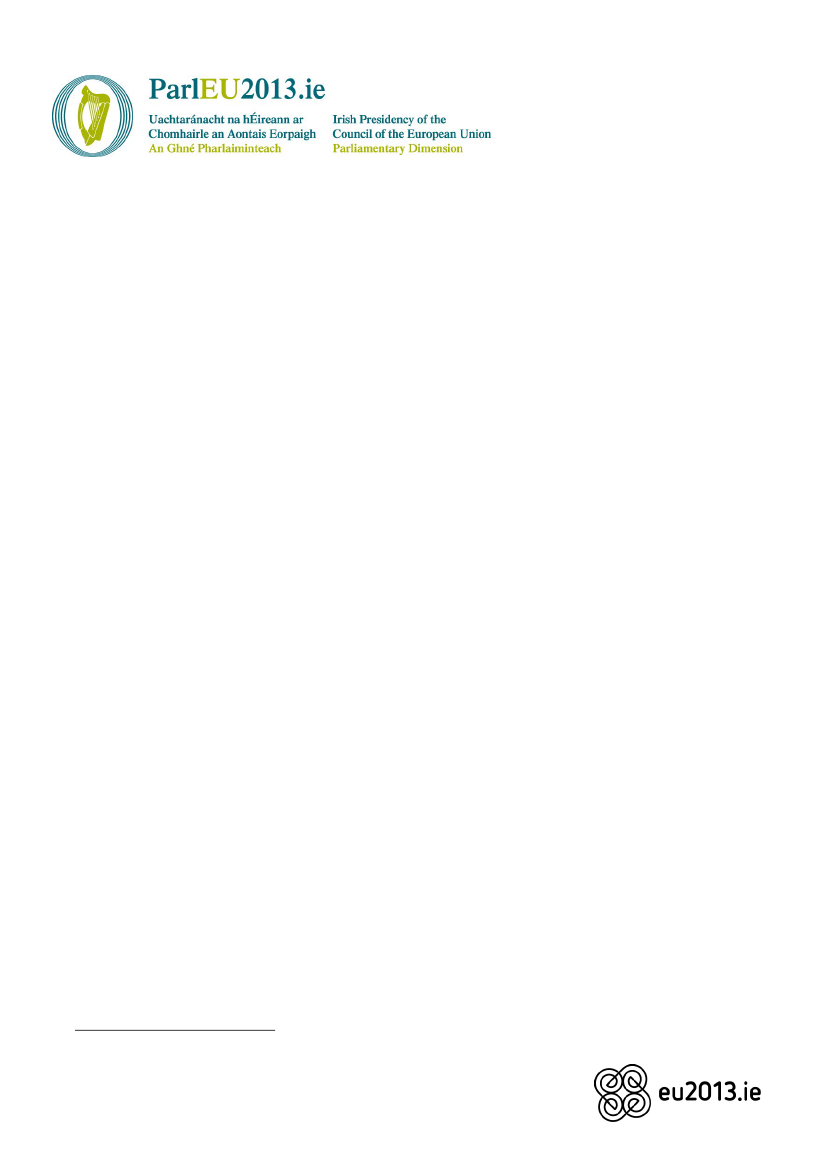
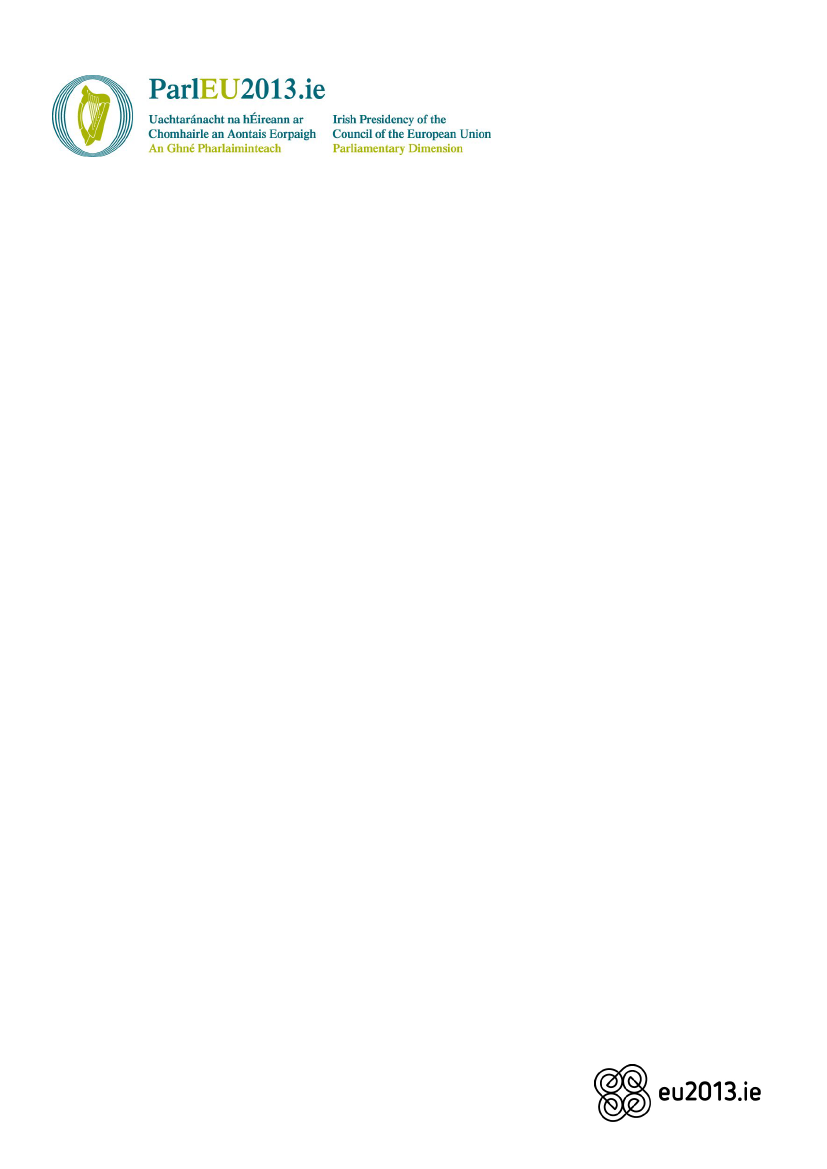
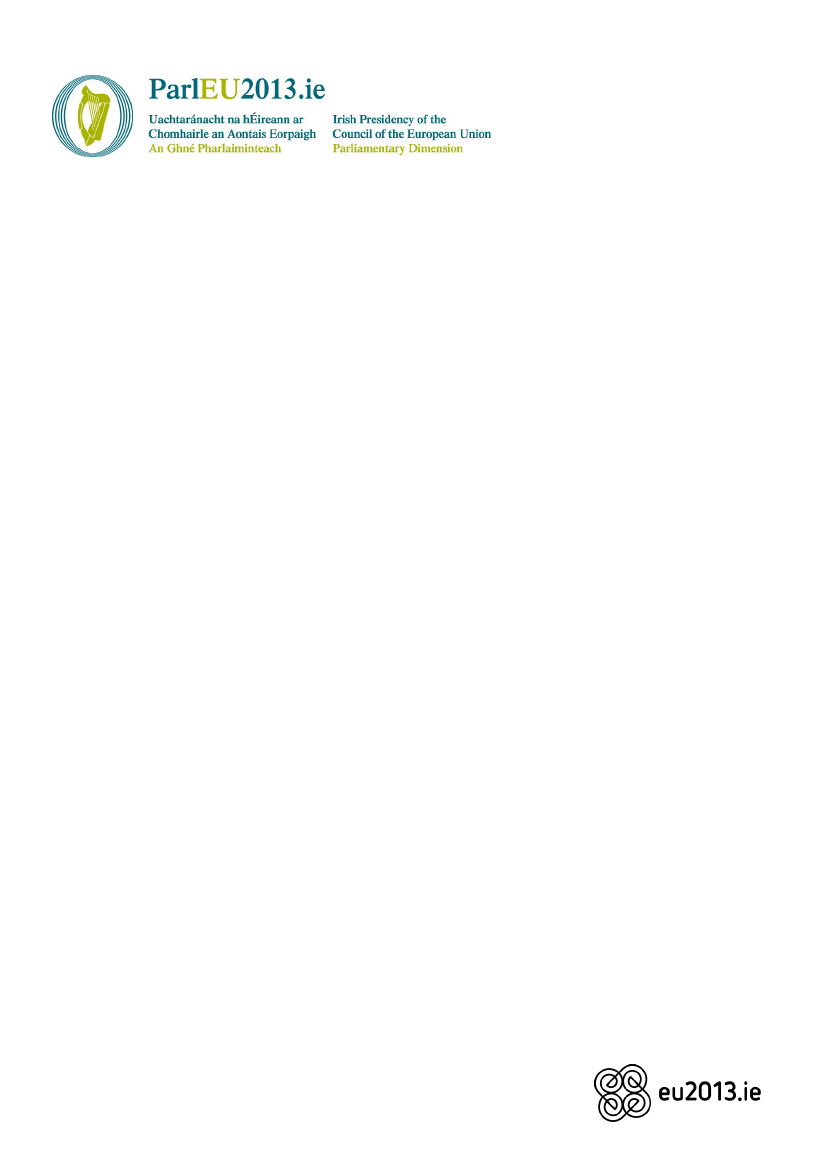
Contribution of the XLIX COSAC
Dublin, 23-25 June 2013
Economic Governance
1. COSAC welcomes the important debate that is taking place at EU level and inthe Member States on plans for the phased completion of the Economic andMonetary Union (EMU), and the strong role that Parliaments are playing aspart of that debate.2. COSAC welcomes the EU's strong determination to foster Europe'scompetitiveness and to stimulate sustainable growth, jobs and socialcohesion in Europe, while pursuing fiscal consolidation.3. COSAC acknowledges that there is broad consensus on the need for greaterdemocratic accountability and legitimacy to underpin this process, and in theEU more generally, and welcomes the initiative by the Commission andEuropean Council to place these issues on the agenda, as part of the widerdebate on EMU.4. COSAC notes the increasing involvement of Parliaments in the EuropeanSemester, but acknowledges that many Parliaments are not yet fully satisfiedwith their involvement in the process. COSAC encourages those Parliamentsto engage more fully in the Semester in 2014, at an earlier stage in theprocess, and to take up the European Commission’s offer of dialogue on theAnnual Growth Survey, country-specific and euro area recommendations.5. COSAC welcomes the significant steps that have been taken in recent monthsto strengthen EMU. COSAC notes the adoption of the so-called “Two Pack”Regulations on greater budgetary surveillance in the euro area, andwelcomes in particular the provisions concerning the right for nationalParliaments to request the Commission to present its opinion on a draftbudgetary plan to that Parliament.6. COSAC welcomes the progress as regards the completion of the elementsalready agreed for a banking union and notes the conclusion of negotiationson a Council Regulation conferring specific tasks on the European CentralBank concerning policies relating to the prudential supervision of creditinstitutions, and specifically welcomes the inclusion of provisions regardingaccountability and reporting by the ECB to the European Parliament, and thatat the request of a national Parliament, a representative of the BankingSupervisory Board, together with a representative of the competent nationalauthority, will be obliged to appear before that Parliament to answerquestions about the performance of supervisory tasks.7. COSAC looks forward to the time-bound roadmap to be presented by thePresident of the European Council to the European Council in June on thecoordination of national reforms, the social dimension of EMU, the feasibilityand modalities of mutually agreed contracts for competitiveness and growth,and solidarity mechanisms. COSAC emphasises the need for these proposals topermit the setting up of mechanisms leading to a Sustainable Energy andClimate Europe.8. COSAC welcomes the European Commission's 2013 Convergence Report onLatvia and also the progress that Latvia has made in fulfilling the conditionsfor adopting the euro on 1 January 2014 as a further indication of thestrengthening of economic integration in the EU.Democratic accountability and legitimacy
9. COSAC considers that the Commission initiative on preparing for the 22-25May 2014 European elections is particularly welcome, nevertheless it remainsdeeply concerned about the level of disconnect between Europe’s citizensand the European Union; within the framework of Article 10, par.2 of TEU,COSAC underlines the importance, in relation to the European Year ofCitizens, of launching genuine public debate prior to the elections in order tostimulate high participation and strengthen the connection between thecitizens and the European Union; in this regard, Parliaments and politicalparties should engage further as facilitators of debates on EU matters raisingawareness among citizens on their rights and on the challenges at stake atEuropean elections.10.COSAC believes that Parliaments, also through European and nationalpolitical parties, have a special role to play in establishing links betweencitizens and European decision-making. It acknowledges that Parliamentsshould aim to make greater use of existing tools, but considers that newmechanisms will also have to be found in order to adequately address, forParliaments and ultimately citizens, the issues of democratic legitimacy andaccountability.11.COSAC therefore calls on the European Commission and the European Councilto engage with Parliaments and to come forward with concrete proposals forgreater democratic legitimacy and accountability with the same sense ofurgency and ambition as that which has pertained to progressing otheraspects of the completion of EMU.
Youth Employment
12.COSAC calls on the European Council in June to agree effective and urgentmeasures for combating youth unemployment. COSAC emphasises the need topromote the mobility of young job-seekers and workers, including bystrengthening the “Your First EURES Job” programme to boost cross-borderrecruitment and by creating an “Erasmus” programme for professionaltraining. COSAC underlines the importance to encourage youth and femaleentrepreneurship by enhancing the flows of credit to SMEs, including thedevelopment of microcredit.Enlargement
13.COSAC believes that, notwithstanding the deeper integration that is takingplace and envisaged in the EU, that momentum in the transformative processof enlargement should be maintained, and that a realistic prospect ofeventual accession needs to continue to be offered to candidate andpotential candidate countries in order to incentivise the necessary reforms.14.COSAC looks forward to the accession of Croatia to the European Union on 1July, and to the participation of Croatian parliamentarians as full COSACmembers, beginning under the Lithuanian Presidency.15.COSAC welcomes the agreement reached in April between Serbia and Kosovo,as well as the Implementation Plan agreed upon in May. COSAC notes theCommission’s recommendation for negotiations to be opened with Serbiaconcerning EU accession. Furthermore, COSAC recognises the Commission’srecommendation for negotiations to be opened with Kosovo on a Stabilizationand Associations Agreement and the Commission’s report for itsimplementation.16.COSAC calls on the Council to open negotiations with Serbia and the formerYugoslav Republic of Macedonia on EU accession, and with Kosovo on aStabilisation and Association Agreement, and also notes progress achieved innegotiations with Montenegro and Turkey, under the condition, especially inthe latter case, of the continuation of reforms and of the respect of thecriteria of Copenhagen.17.COSAC is deeply concerned about the news coming from Turkey. The right toprotest peacefully as well as pluralism and tolerance are some of the pillarsof democracy. It is necessary to approach the different positions andorientations through dialogue and peaceful confrontation. Trusting thatTurkey will be able to overcome this difficult period, by choosing without anydelay the role of a mature democracy, COSAC will continue to firmly believein Turkey’s European perspective and in its role as a major factor for stabilityand geopolitical balance in the countries of the Mediterranean and theMiddle-East. COSAC also wishes the EU to be present with determination toreach these goals.18.COSAC appreciates that compromise decisions required by the EU wereadopted by the Assembly of Albania prior to the parliamentary elections of 23June concerning certain reforms in the area of judicial and publicadministration as well as regarding the revision of the parliamentary Rules ofProcedure. COSAC calls upon the Albanian political parties which will formthe new government nevertheless to remain fully committed to the rule oflaw. COSAC highlights the importance of the implementation of the roadmapon EU integration in order to ensure the entry into force of the Stabilisationand Association Agreement with Bosnia and Herzegovina. COSAC calls on itsmembers to further develop inter-parliamentary engagement with bothcountries.19.COSAC calls on national Parliaments, as institutions being informed ofapplications for EU membership in accordance with Article 49 of the Treatyon European Union, to engage further, more fully and comprehensively in theenlargement debate as a means of enhancing public debate on the issue atnational level in their respective Member States.Development
20.COSAC is mindful of the need to achieve the Millennium Development Goals(MDGs) in full and of the historic opportunity to build on the MDGs and theglobally agreed priorities they represent, to focus political attention anddirect international cooperation efforts towards a limited number ofachievable goals.21.COSAC is conscious that the deadline for the achievement of the MDGs isdrawing close, and that, pending their achievement, global discussions onhow to build on the MDGs have started in order to seek to articulate theprinciples for a new globally agreed set of priorities for internationalcooperation aimed at eradicating extreme poverty.
22.COSAC acknowledges the strong views expressed by civil society organisationsin Europe and across the globe on the need to base the new developmentframework on the needs, rights and priorities of communities experiencingpoverty, exclusion and discrimination.23.COSAC encourages EU leaders to develop national and local level initiativesaimed at forging consensus on the key priorities in the fight against povertyand marginalisation in Europe and globally, and to communicate theoutcomes of such initiatives.24.COSAC emphasises the need to work towards a continuous strengthening ofthe EU’s and of Members States’ development cooperation programmes,through the delivery on their commitments on aid quantity and aid quality;and to phase out all forms of tied aid, in line with the Paris Declaration andthe Busan Partnership for Effective Development Cooperation.25.COSAC calls on national Parliaments to engage further, more fully andcomprehensively in the development debate as a means of enhancing publicdebate on the issue at national level in their respective Member States.Subsidiarity
26.COSAC acknowledges the work of the Commission in dealing with the largenumber of reasoned opinions sent to it by national Parliaments. However,COSAC urges the Commission to respond to reasoned opinions issued bynational Parliaments with greater speed and with greater focus on thearguments contained within each reasoned opinion.27.While COSAC values practical arrangements published by President Barroso in2009 it believes that lessons can be learnt from the experience of the first"yellow card" in response to the "Monti II" proposal.1In practice, a degreeof uncertainty surrounded these arrangements following the triggering of thefirst yellow card and COSAC, therefore, invites the Commission to review, toimprove and to clarify how these arrangements should operate for both theyellow and orange cards.28.COSAC invites the Commission, in this review, to state, in particular, how andwhen its responses should be issued in response to the cards so triggeredand the timeframe within which this will be undertaken.
1
COM (2012) 130
29.COSAC also invites the Commission to identify the way in which itwill communicate with national Parliaments in the scenario where a card has
been triggered and encourages the Commission to address more specificallythe concerns raised by national Parliaments in their reasoned opinions. In thiscontext COSAC notes that in March 2013, following a request to theCommission in the XLVIII COSAC contributions, those national Parliamentsthat submitted Reasoned Opinions on the Monti II proposal received lettersfrom the Commission providing reasoning why it considered that the principleof subsidiarity had not been breached. However, COSAC notes that theresponse was generic and did not engage with all the specific argumentsraised by the individual national Parliaments.30.Finally, COSAC believes that the eight week period given for subsidiarityscrutiny is in most cases sufficient. However, in the context of the debate onthe future of the EU it highlights that a future Treaty revision should takeaccount of the opinion of national Parliaments that a longer period wouldmake the process easier and mitigate the impact of periods of holidays andparliamentary recess and emphasises that an extension would not mean asignificant slowing down of the European legislative procedure.Political dialogue
31.COSAC considers that national Parliaments should be more effectivelyinvolved in the legislative process of the European Union not just as theguardians of the subsidiarity principle but also as active contributors to thatprocess. This goes beyond the adoption of reasoned opinions on draftlegislative acts which may block those acts and would involve a morepositive, considered and holistic view under which Parliaments could invitethe Commission to develop legislative proposals which they believe to benecessary or to review and adapt existing proposals for specific statedreasons.32.Article 12 of the Treaty of the European Union notes that nationalParliaments contribute actively to the good functioning of the Union and inthat context COSAC will continue to seek to enhance and to promote thefurther positive involvement of national Parliaments in the legislativeprocess.33.COSAC calls on the Commission to consider within the existing context ofpolitical dialogue any individual or collective requests from nationalParliaments for new legislative proposals.34.COSAC notes the growing importance of national Parliaments' scrutiny to thelegislative process. In the particular context of the 2014 European elections,COSAC draws to the attention of the Presidential Troika, the Council, theEU Coordinator: Máirín Devlin, Telephone (direct) 00353 1 6183258, [email protected]
European Parliament, and the Commission the need to allow proper time fornational scrutiny before legislation is concluded.
35.COSAC also calls on the Commission to give special attention andconsideration to opinions on a specific legislative proposal or specific aspectsof a proposal that have been issued in the context of the political dialogue byat least one third of national Parliaments.36.The Commission is invited to update national Parliaments in advance inwriting or at a subsequent COSAC Chairpersons or Plenary meeting or at anyother appropriate and relevant interparliamentary conference organised bythe Presidency on its reactions to any such requests or any politicalcontributions so received as set out above.37.With a view to enhancing the involvement and engagement of nationalParliaments in the upstream policy formulation process, COSAC invites theCommission to ensure that national Parliaments are specially alerted to allCommission public consultations when they are launched, as called for in theContribution of the XLVII COSAC, and to pay special attention to anycontributions made by Parliaments to any such consultations.







